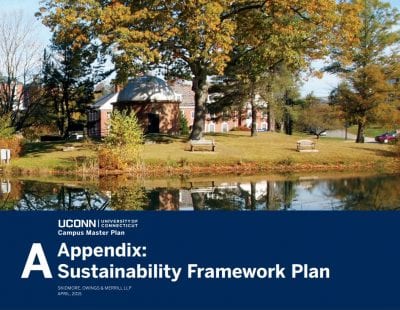
Sustainability Framework Plan
 The Sustainability Framework Plan lists a series of initiatives and objectives in the five areas of energy, water, land, materials, and movement that act as a lens through which the UConn Master Plan of 2015 was formed. The purpose of the master plan is to provide the foundation for advancing the aspirations and development goals of the university as they relate to sustainability in order to create an environment where ideas, imagination, and creativity can thrive. The Master Plan thus will transform the campus in regard to both academic and student life and will enhance the campus’ environmental sustainability.
The Sustainability Framework Plan lists a series of initiatives and objectives in the five areas of energy, water, land, materials, and movement that act as a lens through which the UConn Master Plan of 2015 was formed. The purpose of the master plan is to provide the foundation for advancing the aspirations and development goals of the university as they relate to sustainability in order to create an environment where ideas, imagination, and creativity can thrive. The Master Plan thus will transform the campus in regard to both academic and student life and will enhance the campus’ environmental sustainability.
It is common for other Universities to include sustainability at a high level in their campus Master Plans and other guiding documents. UConn’s Sustainability Framework Plan, however, takes this one step further by directing the development of the Master Plan with action steps the University plans to take to ensure sustainable growth and by encompassing the five areas of energy, water, land, materials, and movement, rather than just focusing on one aspect of sustainable growth. The Master Plan also carries the sustainable design themes, goals, and objectives throughout the other technical framework plans; noting specific sustainable features as an integral part of the Design Guidelines and detailed District Plans, for example.
Although UConn is a leader in sustainability in many respects, the Sustainability Framework Plan outlines several new initiatives and objectives that emulate those of the institution’s peers and demonstrates the University’s commitment to seeking innovative solutions to climate change, development, and water shortages in the face of growing student enrollment.

In the area of energy, The Sustainability Framework Plan will foster climate-positive development that aligns with the current Climate Acceleration Plan’s goal to reach carbon neutrality by 2050. The Sustainability Framework Plan identifies natural and engineered systems to reduce storm water runoff and improve water quality despite predicted increases in impervious surfaces through Next Generation CT. Similarly, the Sustainability Framework Plan outlines several methods to conserve potable water, namely through reuse at UConn’s Water Reclamation Facility, in order to maintain an adequate supply even as enrollment at the University is intended to increase. The Sustainability Framework Plan also includes provisions to improve natural landscaping, increase local food production, and protect and enhance local ecosystems as the University continues to grow. Through the Sustainability Framework Plan the University also hopes to implement more exacting green purchasing standards to increase the proportion of reused and recycled products, and introduces strategies to decrease the amount of waste our University produces. Finally, the Sustainability Framework Plan aims to establish a multi-modal transportation system, alternative commuter options, and a larger “Clean” fleet in order to improve upon our current transportation system.
2004 Sustainable Design Guidelines UConn's Sustainable Design and Construction Policy